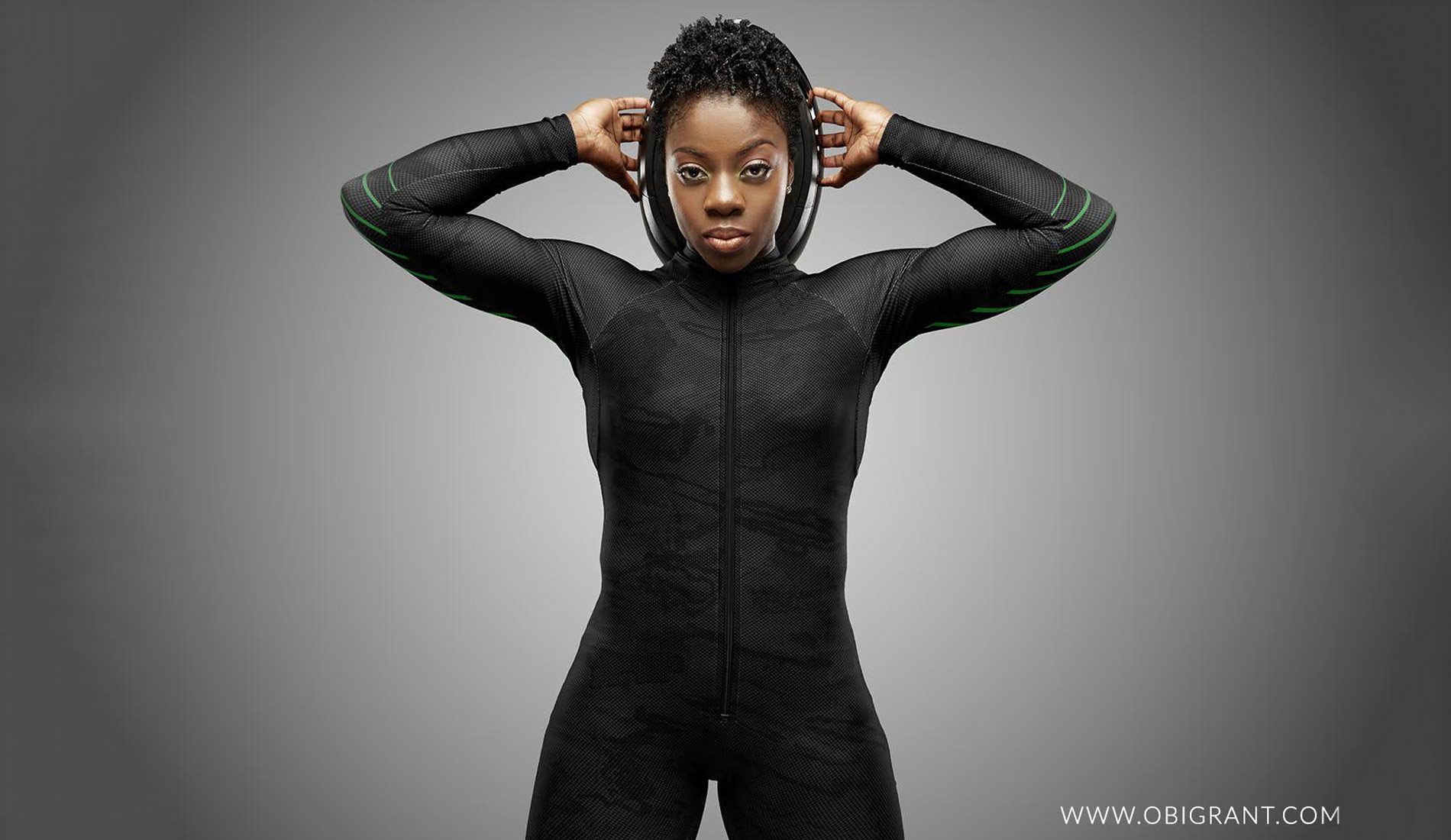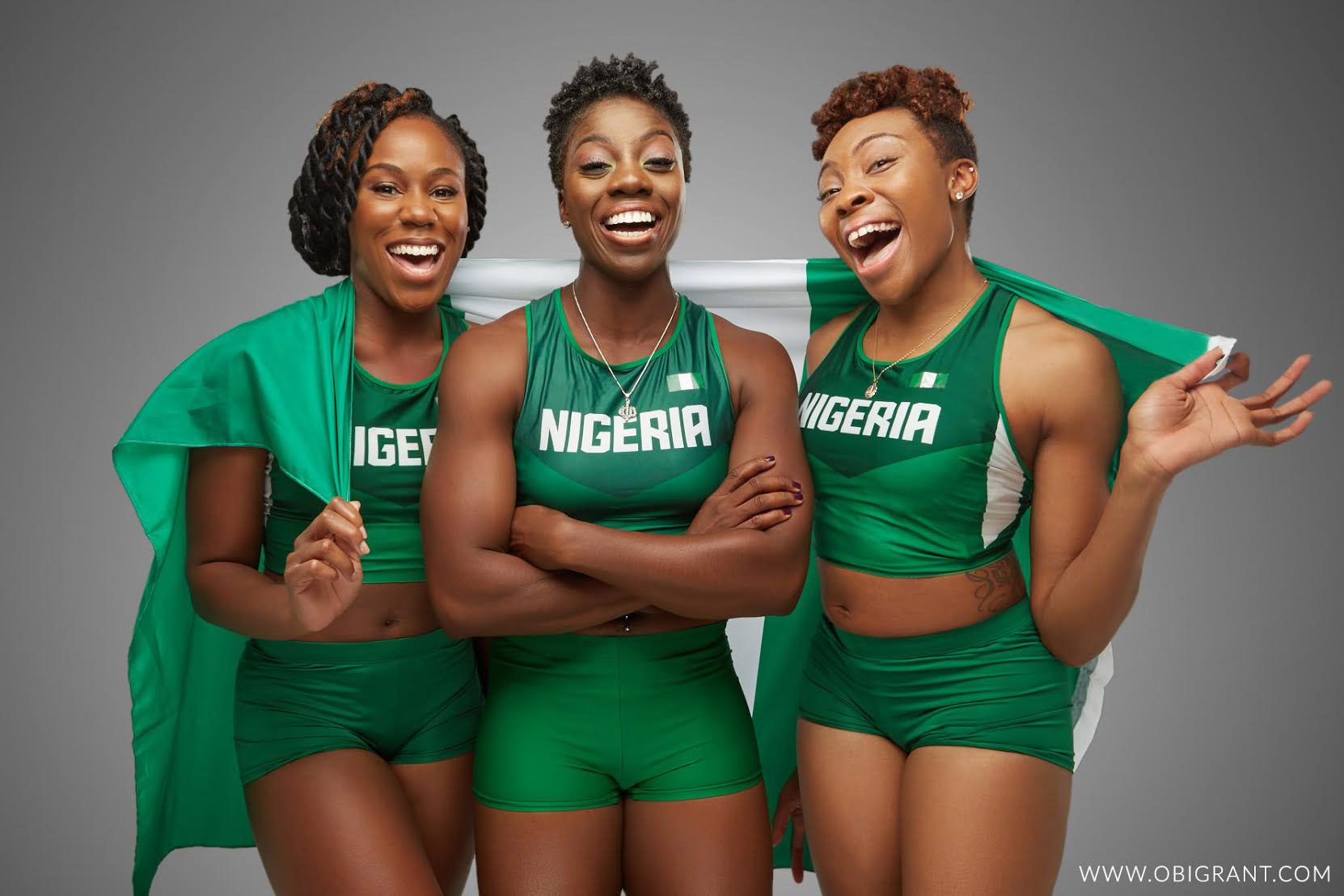- Future Students
- How to Apply
- Visit UHCL
- Admitted Students
- Tuition, Costs and Aid
- Degrees and Programs
- Contact Admissions
- Current Students
- Class Schedule
- Academic Calendar
- Advising
- Events
- Library
- Academic Resources and Support
- Student Services and Resources
- Alumni
- Lifetime Membership
- Alumni Events
- Update Your information
- Awards and Recognitions
- Give to UHCL
UHCL grad’s purpose-driven life: biomechanist, Olympian
December 11, 2017 | Jim Townsend

Above: Graduate and Olympian Seun Adigun. Below: Nigeria women's bobsled team Akuoma Omeoga, Adigun and Ngozi Onwumere. Photos by Obi Grant.
On Dec.17 Moriam “Seun” Adigun will don a cap and gown to receive a master’s degree
in exercise and health sciences from University of Houston-Clear Lake – the day after
she receives her doctor of chiropractic from Texas Chiropractic College as a graduate
of the institutions’ dual degree program.
If that weren’t achievement enough, in February, she’ll put on a helmet and spiked shoes to push a sled that costs more than most luxury cars down an icy track in Pyeongchang, South Korea. She’ll jump aboard and hit speeds of 90 mph through twisting tunnels at the 2018 Winter Olympic Games as captain of the first-ever Nigerian Women’s Bobsled Team.
It’s a team she created for a new sports federation she founded. It will be the first time Africa – let alone Nigeria – fields a bobsled team in the Winter Games. Born and raised in Chicago by her Nigerian parents, Adigun has dual citizenship under Nigerian constitution, which allows her to compete for the country.
“It’s kind of a crazy story,” she said.
Starting from zero
A little over two years ago, she knew nothing about the sport when she tried out for the U.S. Women’s Olympic Bobsled Team. She had never actually ridden a bobsled. She trained on a wood-and-wheels sled she built in the garage of her Houston home. And then, after qualifying for the U.S. team, she decided she needed to compete for Nigeria instead.
 She recruited two Houston-area athletes – also of Nigerian descent – to be her teammates.
Adigun is the driver of the two-person bobsled. As the “brakemen,” Akuoma Omeoga and
Ngozi Onwumere take turns in the rear seat. As a team, they call themselves the “Ice
Blazers.”
She recruited two Houston-area athletes – also of Nigerian descent – to be her teammates.
Adigun is the driver of the two-person bobsled. As the “brakemen,” Akuoma Omeoga and
Ngozi Onwumere take turns in the rear seat. As a team, they call themselves the “Ice
Blazers.”
As Adigun finished up a grueling dual-degree academic program, she took precious time off to complete prequalifying events in Utah, British Columbia and Alberta, Canada. Also, she raised $75,000 on GoFundMe – which reportedly included $50,000 from an anonymous benefactor.
The women have captured the attention of sportswriters around the world who have likened their quest to the 1988 Jamaican Men’s Bobsled Team and subsequent Disney movie, “Cool Runnings.”
Adigun doesn’t mind comparisons to the Jamaicans’ groundbreaking team. “That’s actually really cool because here we are 30 years later and they’re still singing the praises of these men who started this train and created this positive impact on the entire world,” she said.
“To be compared to something like that is truly magical. And I think it’s such an honor.”
The Ice Blazers’ hard work and positive press has helped secure much-needed sponsorships, the biggest of which are Visa and Under Armour.
“Ms. Amazing”
Fans and sportswriters call Adigun “Ms. Amazing,” noting her warrior spirit, athletic and academic prowess, strength of character – and perhaps for the ever-present anklet she wears that says, “Ms. Amazing.” But friends know that’s not how the sometimes shy athlete sees herself.
“Ms. Amazing” was her pet name for her younger sister Amezee, who battled back from multiple crises brought on by sickle-cell anemia until she died nine years ago in a traffic accident.
“We called her MaeMae,” Adigun said. “When she passed away my senior year in college, I decided to dedicate everything and anything that I was passionate about to her memory. Not just athletics. Anything that was meaningful or impactful to me.
“I always wear this anklet that says ‘Ms. Amazing.’ And so now people call me Ms. Amazing because they see it. I say, ‘It’s not me. But I honor Ms. Amazing.’”
Not her first Olympics
It won’t be Adigun’s first Olympics. Winner at the All-African Games in 2010 and African Championships in 2011 for the 100-meter hurdles, she joined Nigeria’s track team for London’s 2012 Summer Olympic Games.
She had earned her bachelor’s and first master’s degree at University of Houston, where she enjoyed success on UH’s track team. She joined the staff there – coaching men and women sprinters and hurdlers – while simultaneously training for the 2012 Games.
Five months before the Games, she noticed the onset of what became a stress fracture in her left leg. It wasn’t healed but she ran anyway. “I had reached the point where I just had to deal with this,” she said. “So I modified my training. I had been working for too long and too hard to make it to these Games for me to stop.”
She finished the race but didn’t qualify out of her heat. It marked a turning point in her career. “Even though I knew I was retired from track and field in 2012, I never announced it. Ever. No one knew. Which is kind of unusual for someone who had several national titles,” she said.
Olympic fever
She was done with track. She just wasn’t done with sports. “I didn’t understand why I didn’t announce my retirement until I started to get Olympic fever again,” she said.
Adigun said she had several friends who had transferred from track to bobsled. “Watching the 2014 Winter Games, I said, ‘I think I can actually do this. This is kind of cool.’ So I did a little research.”
The U.S. had a strong team, so she decided to try out. In May 2015, she started training for a competitive tryout to be held in Dallas that July. “This voice in my head was telling me, ‘If you do not start training right now this window of opportunity is going to pass you by.’”
At the Dallas “combine,” the events included sprints, broad jump and similar feats in which she already excelled. Competitors had to score a combined 450 points to be considered for the U.S. bobsled team. She scored 515. “I was just super lucky that my athleticism carried me through,” she said.
In August 2015, she was invited to try out for the team at trials in Lake Placid, N.Y. She had to score in the top six to qualify. She finished third. A month later, she would compete for a rank on the U.S. team. But up until September 2015, she had never actually been on a bobsled. She had never even been sledding – despite growing up in wintry Chicago.
“I didn’t have a clue about the sport. I thought I just had to run to push this thing and jump in,” she said. “I had to learn that it’s actually way more technical than that.”
She built a practice sled in her Houston garage, cobbled from parts bought at a local hardware store. She christened it the “Maeflower,” in honor of her sister.
Changing careers
By May 2014 Adigun had resigned her coaching position at UH for academic pursuits, although she continued as a volunteer coach and mentor.
“I was in my fifth season coaching at UH,” she said. “I decided at that point that there was something that I felt like I was missing with regards to really trying to help my athletes become the best that they could be.”
She discovered she had an innate ability to intuitively observe the biomechanics of athletes. “I could see things. I could see shapes. I could see forces, I could see the angles. And I could see symmetry. And when there was asymmetry and something wasn’t right I would be able to see it,” she said.
“But I couldn’t give you the ‘why.’ And so I knew that I needed to go and further my education. I’ve been someone who was plagued with injuries and I didn’t want to have my athletes deal with that because of something I missed.”
Adigun enrolled in the chiropractic college – a 10-trimester program. After six trimesters, students can apply for UH-Clear Lake’s dual degree program to earn a master’s in exercise and health sciences.
“For a while I didn’t understand it,” she said. “I asked myself, ‘Seun, what are you doing in this sport? Why are you killing yourself trying to be a doctor? And then picking up a sport that you don’t know anything about?’ I prayed about it.
“I answered myself, ‘I don’t know why I’m here or what I’m doing. I’m just riding on faith right now because there’s so many things that are happening that are out of my control.’ And I’m not used to being not in control.”
Purpose-driven decisions
Even though making the U.S. team was a certainty, Adigun was impelled to try something more improbable: build a bobsled team for Nigeria while finishing up two degrees.
As it turned out, the Nigerian Olympic Committee had considered putting together a bobsled team in 2014, but it couldn’t find the athletes. “My head was just spinning,” Adigun said. “I told myself, ‘Holy moly. I think I have to do this. I have to start this team.”
Torn, she called the U.S. coaches. They encouraged her to go for it, for the sake of bringing more countries, more athletes and more fans to the sport.
“I’m not a believer in coincidence. I’m a believer in blessings,” said Adigun. “I’m a real faith-driven person and I just feel like God will show you your purpose. It’s just a matter of whether you accept it.”
UHCL commencement exercises are at noon and 5 p.m. on Sunday, Dec. 17 in the NRG Arena. Adigun walks in the 5 p.m. ceremony with fellow graduates from the College of Human Sciences and Humanities. For more information, visit www.uhcl.edu/commencement.






